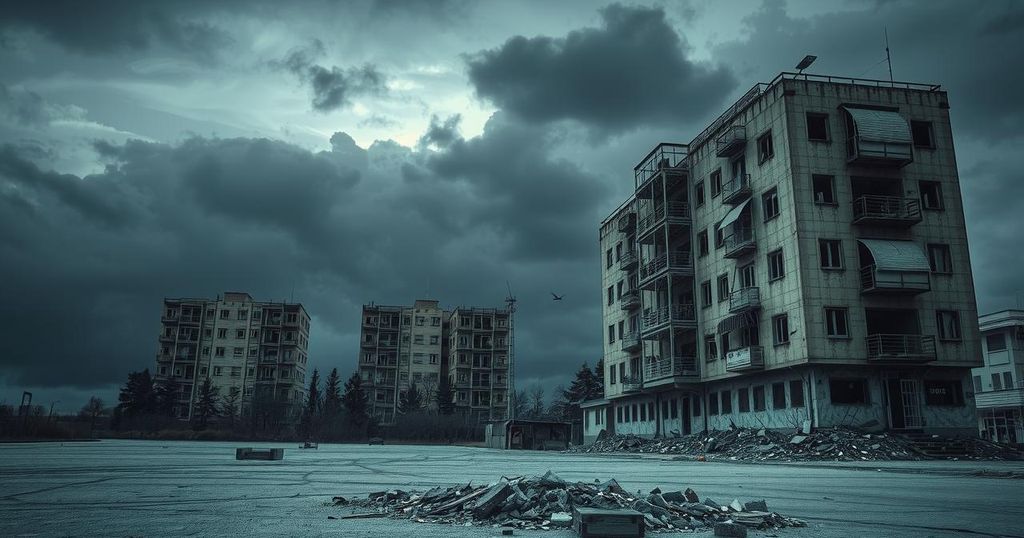Renewed Conflict in Syria: Rebel Gains Spark Civil War Resurgence

The Syrian civil war has intensified following a surprise offensive by rebels that resulted in the capture of Aleppo, prompting airstrikes by Russian-backed government forces. This marks the first significant change in the city since 2016 and complicates the geopolitical landscape in the region. Multiple factions, including Turkish-backed rebels and HTS, are involved, with foreign powers’ distractions potentially influencing the conflict’s dynamics.
The Syrian military, supported by Russia, has commenced airstrikes on areas recently captured by Islamist rebels, following a surprise attack that expelled government forces from Aleppo. The recapture of this key city has reignited the Syrian civil war, potentially drawing Russia and Turkey further into the conflict. This shift in control has urgent implications for regional stability.
The offensive commenced on November 26, with rebels attacking from the northwest, resulting in their entry into Aleppo by November 29-30. This is the first major shift in the city’s control since 2016, when pro-government forces, with Russian and Iranian support, liberated areas previously held by rebels. Current rebel advances have also encompassed regions in Hama province, intensifying the conflict.
In response, the Syrian government has pledged to retaliate against the rebel gains. Russia, which has been involved in the conflict since 2015, is conducting airstrikes to bolster government efforts. This escalation marks a critical increase in hostilities, adding to the already devastating humanitarian toll in Syria, which has seen hundreds of thousands killed since the onset of war in 2011, during the Arab Spring uprising against President Assad.
The attack was spearheaded by Hayat Tahrir al-Sham (HTS), formerly the Nusra Front, al Qaeda’s branch in Syria until its split in 2016. HTS has been a dominant force in the Idlib region, maintaining a foothold despite government advances. The United States, Russia, Turkey, and other nations classify HTS as a terrorist organization. Another rebel faction, backed by Turkey, has also mounted a separate offensive in northern Aleppo under the Syrian National Army’s banner.
The recent surge in conflict is attributed to shifting power dynamics, particularly with the government’s main backers, Iran, Russia, and Hezbollah, preoccupied by external conflicts, including the war in Ukraine and tensions with Israel. U.S. National Security Advisor Jake Sullivan remarked that this situation provides an opportunity for the rebels, noting the distractions faced by Assad’s supporters.
Despite a general stabilization agreed between Russia and Turkey in 2020, Turkey is becoming increasingly dissatisfied with Assad’s inability to negotiate peace with the opposition. Turkish officials have voiced concerns over the Syrian government’s military actions against rebels, advocating for compromise to resolve the ongoing strife. Additionally, Turkey is wary of the Kurdish forces allied with the U.S., which are considered terrorists by Ankara.
The United Nations Security Council’s 2015 resolution aimed at addressing the conflict has struggled to find practical implementation, advocating for a new constitution and credible governance. Geir Pedersen, the U.N. Special Envoy for Syria, has emphasized that the recent escalations highlight the failure to instigate a meaningful political process, calling for intensified negotiations to seek a resolution to the crisis.
The Syrian civil war, having begun in 2011 amid the Arab Spring protests, has evolved into a complex conflict involving multiple factions and foreign powers. The war has devastated the country’s infrastructure and led to a catastrophic humanitarian crisis, displacing millions. Recent events indicate shifts in rebel control and foreign involvement, including significant actors like Russia, Turkey, and Iran, further complicating prospects for resolution. The resurgence of hostilities in Aleppo signals potential changes in power dynamics and increased regional tensions.
The conflict in Syria has resurfaced prominently following the rebel gains in Aleppo, heightening the risks of broader regional conflict. As the situation unfolds, the balance of power among foreign backers remains precarious. The UN’s efforts at implementing a peace plan appear stalled, necessitating renewed dialogue among all parties involved to prevent further escalation and humanitarian disaster.
Original Source: www.france24.com






